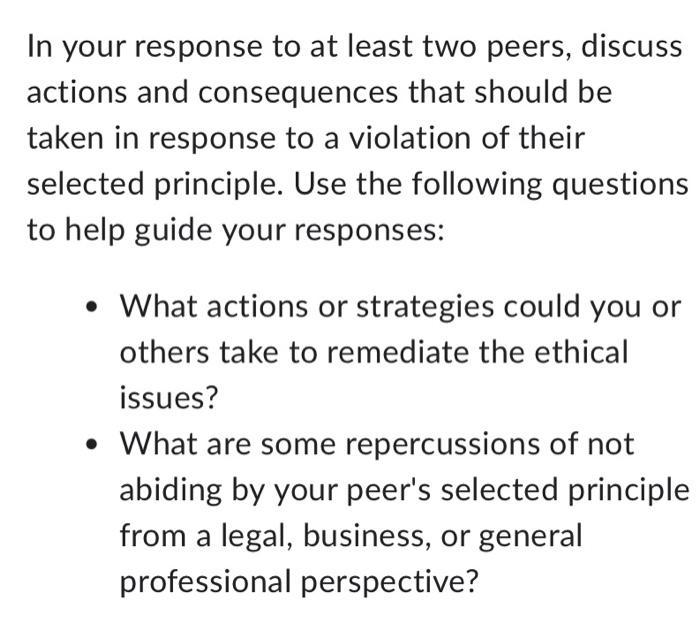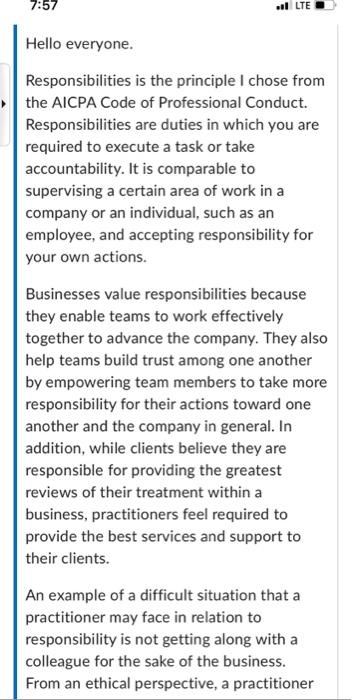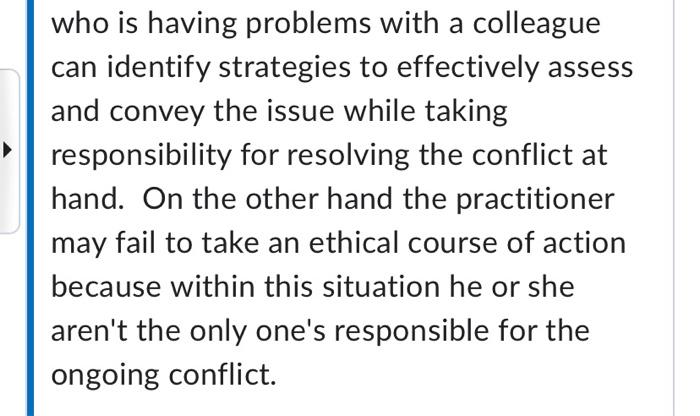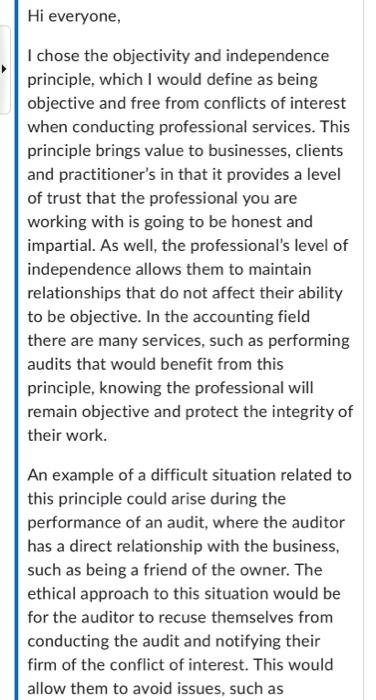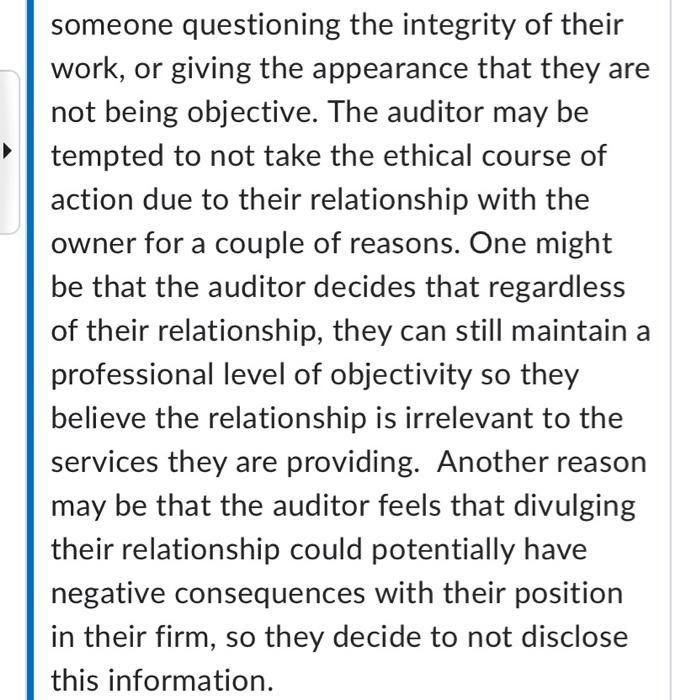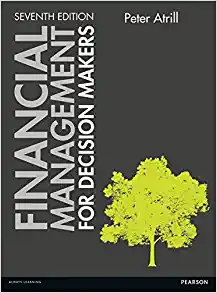In your response to at least two peers, discuss actions and consequences that should be taken in response to a violation of their selected principle. Use the following questions to help guide your responses: - What actions or strategies could you or others take to remediate the ethical issues? - What are some repercussions of not abiding by your peer's selected principle from a legal, business, or general professional perspective? Hello everyone. Responsibilities is the principle I chose from the AICPA Code of Professional Conduct. Responsibilities are duties in which you are required to execute a task or take accountability. It is comparable to supervising a certain area of work in a company or an individual, such as an employee, and accepting responsibility for your own actions. Businesses value responsibilities because they enable teams to work effectively together to advance the company. They also help teams build trust among one another by empowering team members to take more responsibility for their actions toward one another and the company in general. In addition, while clients believe they are responsible for providing the greatest reviews of their treatment within a business, practitioners feel required to provide the best services and support to their clients. An example of a difficult situation that a practitioner may face in relation to responsibility is not getting along with a colleague for the sake of the business. From an ethical perspective, a practitioner who is having problems with a colleague can identify strategies to effectively assess and convey the issue while taking responsibility for resolving the conflict at hand. On the other hand the practitioner may fail to take an ethical course of action because within this situation he or she aren't the only one's responsible for the ongoing conflict. Hi everyone, I chose the objectivity and independence principle, which I would define as being objective and free from conflicts of interest when conducting professional services. This principle brings value to businesses, clients and practitioner's in that it provides a level of trust that the professional you are working with is going to be honest and impartial. As well, the professional's level of independence allows them to maintain relationships that do not affect their ability to be objective. In the accounting field there are many services, such as performing audits that would benefit from this principle, knowing the professional will remain objective and protect the integrity of their work. An example of a difficult situation related to this principle could arise during the performance of an audit, where the auditor has a direct relationship with the business, such as being a friend of the owner. The ethical approach to this situation would be for the auditor to recuse themselves from conducting the audit and notifying their firm of the conflict of interest. This would allow them to avoid issues, such as someone questioning the integrity of their work, or giving the appearance that they are not being objective. The auditor may be tempted to not take the ethical course of action due to their relationship with the owner for a couple of reasons. One might be that the auditor decides that regardless of their relationship, they can still maintain a professional level of objectivity so they believe the relationship is irrelevant to the services they are providing. Another reason may be that the auditor feels that divulging their relationship could potentially have negative consequences with their position in their firm, so they decide to not disclose this information. In your response to at least two peers, discuss actions and consequences that should be taken in response to a violation of their selected principle. Use the following questions to help guide your responses: - What actions or strategies could you or others take to remediate the ethical issues? - What are some repercussions of not abiding by your peer's selected principle from a legal, business, or general professional perspective? Hello everyone. Responsibilities is the principle I chose from the AICPA Code of Professional Conduct. Responsibilities are duties in which you are required to execute a task or take accountability. It is comparable to supervising a certain area of work in a company or an individual, such as an employee, and accepting responsibility for your own actions. Businesses value responsibilities because they enable teams to work effectively together to advance the company. They also help teams build trust among one another by empowering team members to take more responsibility for their actions toward one another and the company in general. In addition, while clients believe they are responsible for providing the greatest reviews of their treatment within a business, practitioners feel required to provide the best services and support to their clients. An example of a difficult situation that a practitioner may face in relation to responsibility is not getting along with a colleague for the sake of the business. From an ethical perspective, a practitioner who is having problems with a colleague can identify strategies to effectively assess and convey the issue while taking responsibility for resolving the conflict at hand. On the other hand the practitioner may fail to take an ethical course of action because within this situation he or she aren't the only one's responsible for the ongoing conflict. Hi everyone, I chose the objectivity and independence principle, which I would define as being objective and free from conflicts of interest when conducting professional services. This principle brings value to businesses, clients and practitioner's in that it provides a level of trust that the professional you are working with is going to be honest and impartial. As well, the professional's level of independence allows them to maintain relationships that do not affect their ability to be objective. In the accounting field there are many services, such as performing audits that would benefit from this principle, knowing the professional will remain objective and protect the integrity of their work. An example of a difficult situation related to this principle could arise during the performance of an audit, where the auditor has a direct relationship with the business, such as being a friend of the owner. The ethical approach to this situation would be for the auditor to recuse themselves from conducting the audit and notifying their firm of the conflict of interest. This would allow them to avoid issues, such as someone questioning the integrity of their work, or giving the appearance that they are not being objective. The auditor may be tempted to not take the ethical course of action due to their relationship with the owner for a couple of reasons. One might be that the auditor decides that regardless of their relationship, they can still maintain a professional level of objectivity so they believe the relationship is irrelevant to the services they are providing. Another reason may be that the auditor feels that divulging their relationship could potentially have negative consequences with their position in their firm, so they decide to not disclose this information
